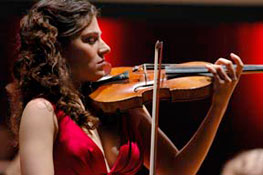by Daniel Hathaway

The excellent concert featured Samuel Barber’s violin concerto with Cleveland-born Diana Cohen in the solo role. It also turned the time-honored order of overture-concerto-symphony a bit inside-out, and was played without intermission. The performance also began at 7:30 — early for a Saturday night performance — and ended by 8:45 when the evening was still young for an unhurried post-performance meal.
Cohen, who currently serves as concertmaster for Canada’s Calgary Symphony, has recently deepened her ongoing Cleveland connections by founding ChamberFest Cleveland with her father, Cleveland Orchestra principal clarinetist Franklin Cohen. Those who have heard her play so eloquently during the first two seasons of that series had the opportunity to experience her artistry as a concerto player at the end of Saturday evening’s program, a role in which she proved to be equally impressive.
Though conceived for a large symphony orchestra, Barber’s unabashedly romantic concerto works just fine with a string section of chamber orchestra proportions (11 violins, 4 violas, 4 cellos and two basses) and may even give the soloist a bit of an acoustical advantage. Diana Cohen played both of its lyrical movements with a dark, unforced tone full of vibrant expressiveness and excellent intonation. Fine wind solos added their own gorgeousness to the solo line and conductor Carlton Woods and the orchestra gave lush, supple support. A slightly more spacious tempo for the second movement Andante would have provided both oboist Martin Neubert and Cohen even a bit more room to emote.
The finale, a perpetual motion machine criticized by its commissioner either for being too difficult (the original story) or for not belonging stylistically to the rest of the work (a bit of revisionism?) presents technical and rhythmic demands for both soloist and orchestra that aren’t always tidily dispatched. Cohen, Woods and BlueWater gave it an incisive, exciting reading with only a few minor hiccups.
Woods was also at the helm for the opening piece, Rossini’s La scala di seta overture, while assistant artistic director Neil Mueller left the trumpet section to conduct the middle work, Haydn’s final London symphony, No. 104.
In the Rossini, the strings played festive swirls of notes with precision and the winds shone in masterful playing of woodpecker-like repeated notes. The Haydn received distinguished treatment, as one would expect from an ensemble drawn from Cleveland’s best freelancers. More pointing up of details and contrasts in dynamics would have made both pieces special.
A 75-minute program uninterrupted by an intermission is a winning concept we hope BlueWater will hang onto. It allows the music to flow naturally from one piece to another and gives an audience all they probably need to hear in one evening.
Next for BlueWater: a November 16 concert at Plymouth Church in Shaker Heights features clarinetist Amitai Vardi and violinist Jieming Tang in Weber and Beethoven, and the orchestra in Mendelssohn, Corigliano and Maxwell Davies.
Published on ClevelandClassical.com September 10, 2013
Click here for a printable version of this article.


